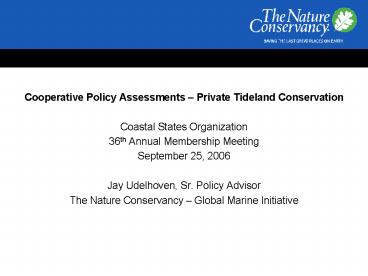Cooperative Policy Assessments Private Tideland Conservation - PowerPoint PPT Presentation
1 / 34
Title: Cooperative Policy Assessments Private Tideland Conservation
1
- Cooperative Policy Assessments Private Tideland
Conservation - Coastal States Organization
- 36th Annual Membership Meeting
- September 25, 2006
- Jay Udelhoven, Sr. Policy Advisor
- The Nature Conservancy Global Marine Initiative
2
Overview
- Context
- Results of Assessments
- Relationship to CZM Programs Reauthorization
- Relationship to OCS Activities
- Next Steps Do They Involve You?
3
Context
- What are we talking about?
- The potential role of NGOs in conserving coastal
and ocean lands and resources
- Beyond
- Advocacy
- Watchdogs
- Policy-making
- Education
- To
- In-water stewards
- Owners
- Govt. Partners
4
Context
Famous Quote
If at first the idea is not absurd, then there
is no hope for it.
- Albert Einstein
5
Context
- Starbucks?
- The Conservancy
- Were BIGGER
- 4 billion in assets
- 1 billion annual revenues
- 30 countries 50 states
- 3,500 employees
- 8 million acres in U.S.
- 120 million acres Worldwide
- 100 coastal marine projects
6
Context
- The Conservancy
- Six years of work
- 2 nationwide assessments
- 4 ownership projects
- 3 leasing projects
- 8 policy assessments
7
Context
- The Conservancy
- Six years of work
- 10-year goal
- 10 in 10 years (2015)
8
Context
- The Conservancy
- Six years of work
- 10-year goal
- External engagement
- Local, State, Federal, International Govt.
Partners - Other NGOs
- WWF, CI, Audubon
- Land Trusts
9
Context
- The Conservancy
- Six years of work
- 10-year goal
- External engagement
- To what end?
- Management of coastal and ocean lands and
resources achieves a balance of human uses,
defined by sustainability of biodiversity, public
access recreation, natural resource extraction,
commerce, and navigation.
10
Context
- The Conservancy
- Six years of work
- 10-year goal
- External engagement
- To what end?
- Pilot policy assessments
- Massachusetts Oregon
- TNC, NOAA-CSC, RWU, CSO
- State and Local Agencies
- Assess develop spatial databases
- Assess possibility of private ownership leasing
11
(No Transcript)
12
(No Transcript)
13
(No Transcript)
14
(No Transcript)
15
(No Transcript)
16
(No Transcript)
17
(No Transcript)
18
- 1.6 M acres tidelands
- 86 K acres of intertidal lands
- 1.5 M acres of subtidal lands
- 75 of shoreline privately owned
- 20 K Ch. 91 licenses
- 348 Ch 130 licenses (980 acres)
19
1 M acres tidelands 11,800 acres public
intertidal estuaries 5,500 acres private
intertidal estuaries
20
(No Transcript)
21
Results
- Massachusetts
- Acquire fee or less-than fee title to privately
owned intertidal lands (Audubon does this now) - Commonwealth license (Ch. 91) could be used on
Commonwealth-owned intertidal and subtidal lands - Aquaculture license likely not available for
conservation use at this time - A pilot project likely needed to work through
process details
- Oregon
- Acquire fee or less-than fee title to privately
owned intertidal (and subtidal?) lands - State waterway lease could be used on state-owned
intertidal and subtidal lands - Aquaculture lease not ideal for conservation use
- Leases being contemplated now
22
Great South Bay Buying to Restore
- Own 13,000 acres
- Co-manage
- 500,000 clams placed
23
Wellfleet Bay Sanctuary Ownership
- Own 1,000 acres
- Uplands and tidelands
- Public facilities education
24
Richardsons Bay Leasing a Sanctuary
- 900 acres
- 2nd, 50-year lease
- Solid community foundation
25
Sarasota Bay Leasing an Island
- 10 acres
- 50-year lease
- Part of a larger sanctuary
26
Woodard Bay Testing a Lease
- 10 acres
- 10-year Lease
- Cultch spat placement
- for Olympia Oyster
- enhancement
27
Relationship to CZMA others
- Do state coastal and ocean resource management
agencies need - ?
- Expertise ?
- Staff Resources ?
- Site-Specific Focus ?
- Outreach ?
- Allies ?
28
Relationship to CZMA others
- Coastal States Organization Annual Meetings
- Coastal Zone Management Conferences
- GeoTools Conference
- International Submerged Lands Management
Conferences - Land Trust Rallies
- Restore America's Estuaries Conference
- Society for Conservation Biology Conferences
- Others?
29
(No Transcript)
30
(No Transcript)
31
Relationship to CZMA
- Protection and restoration of important
biological sites are critical, but to succeed at
scale and over the long-term, we must move to - Integration of Proprietary Interests
- Improved Governance
- Ecosystem-based Management
- Zoning
- Land-Sea Threats Integration
- Ecoregional Assessments
- Conservation Area Plans
32
Relationship to OCS/EEZ activities
- hh
33
Next Steps
34
Next Steps
- How can we work together?
- Policy assessments
- Data assessments development
- In-water restoration
- Long-term management and protection
- Planning
- What are the intersects, immediate and long-term?
- Dinner??






















![Eleanor McGregor [Director: Conservation] PowerPoint PPT Presentation](https://s3.amazonaws.com/images.powershow.com/8026054.th0.jpg?_=20160801045)








